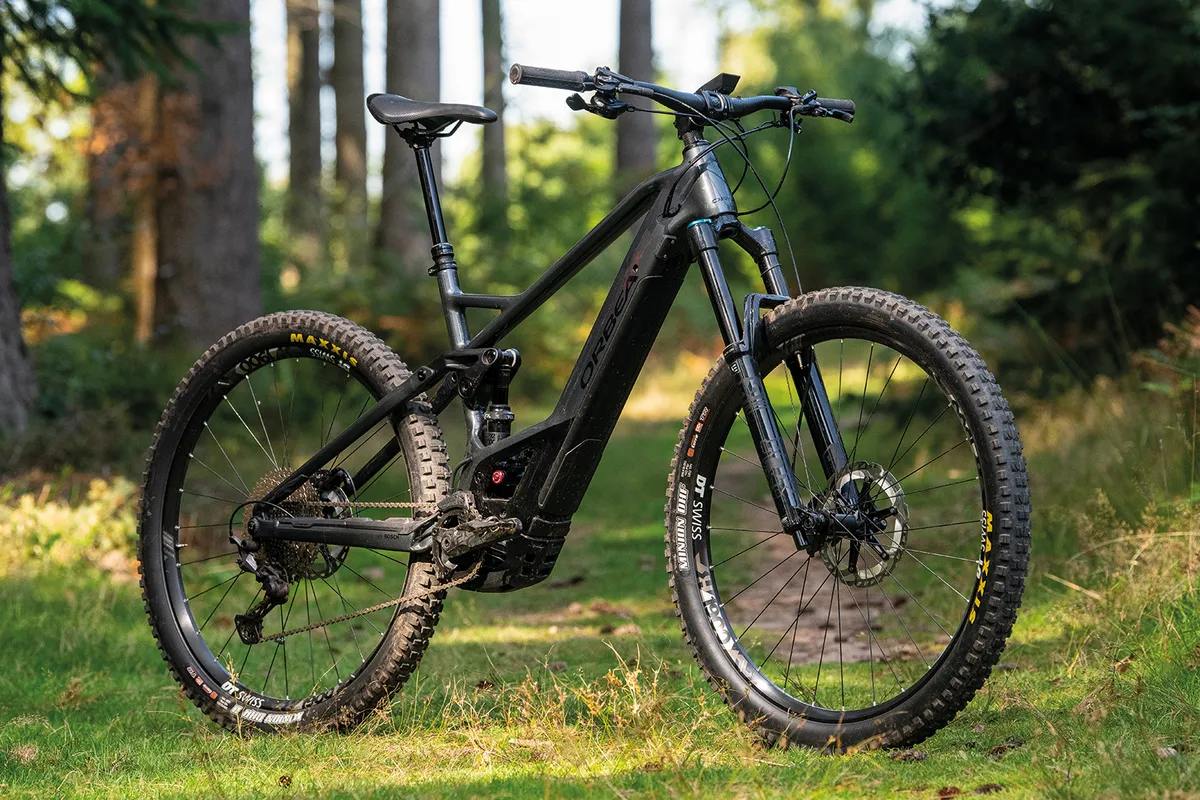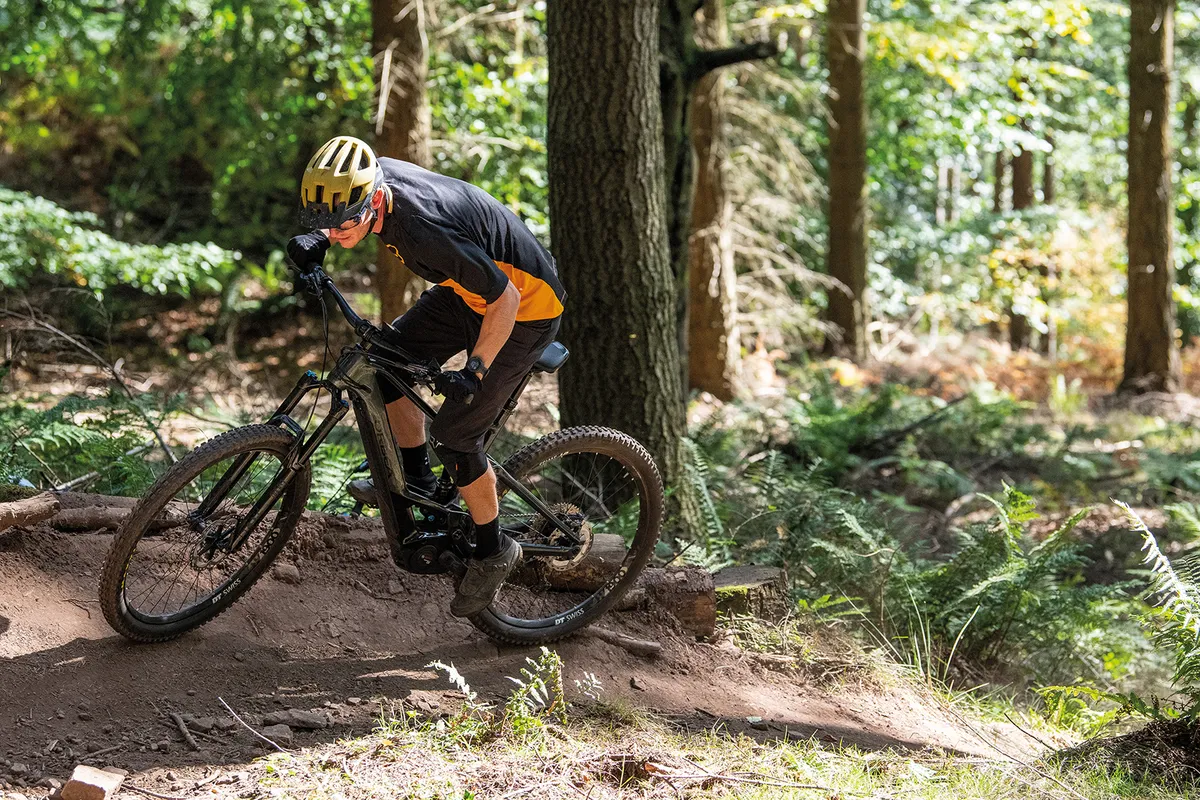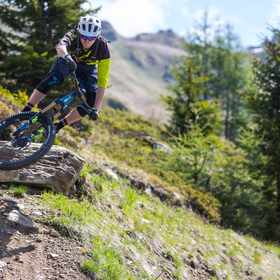Orbea’s Wild FS was one of the first bikes to use Bosch’s Gen 4 motor and impressed us when it launched nearly a year ago. But does it hold up against more recent rivals using the same drive unit?
Orbea Wild FS H10 frame and kit
The integrated 625Wh battery slots into the frame from below, with a plastic cover to stop debris getting in. There’s a handy integrated key for removing it, which screws into the top of the steerer tube.
To compensate for the hole in the down tube, two reinforcing struts have been added above the bottom bracket (BB). The tube has also been left straight for greater stiffness.

There’s no issue with the fork hitting it because the headset limits steering lock to 82 degrees from straight ahead. You can fit either a bottle cage or a range-extender battery (sold separately) on the down tube.
The suspension linkage is very progressive, making it supple near the start of its stroke.
Shimano’s 12-speed XT drivetrain allows multiple downshifts at once, although with the SunRace ebike cassette and powerful Bosch motor, doing so is rarely smooth. If you order through Orbea’s website, you can upgrade the fork and shock, and change the dropper post travel.
The 2021 bike should come with a Fox 38 fork, but ours had the 36 E-Bike due to lack of availability. This is stiffer than a regular 36 and has the same GRIP damper as the 38, so shouldn’t have made a huge difference to the ride.
Orbea Wild FS H10 geometry
| | S/M | L | XL |
|---|---|---|---|
| Seat angle (degrees) | 76 | 76 | 76 |
| Head angle (degrees) | 65.5 | 65.5 | 65.5 |
| Chainstay (cm) | 45.5 | 45.5 | 45.5 |
| Seat tube (cm) | 40.6 | 44.4 | 48.3 |
| Top tube (cm) | 58.5 | 61.2 | 64.5 |
| Head tube (cm) | 10 | 11 | 12.5 |
| Fork offset (cm) | 4.4 | 4.4 | 4.4 |
| Bottom bracket drop (cm) | 3 | 3 | 3 |
| Bottom bracket height (cm) | 34.5 | 34.5 | 34.5 |
| Wheelbase (mm) | 1,203 | 1,232 | 1,268 |
| Standover (cm) | 72.5 | 74 | 76.5 |
| Stack (cm) | 62.1 | 63 | 64.4 |
| Reach (cm) | 43 | 45.5 | 48.5 |
Orbea Wild FS H10 ride impressions
The Wild FS is the best climber out of the three bikes on test, which also included the Mondraker Crafty R 29 and Lapierre Overvolt GLP 2 Elite.
The 76-degree effective seat angle and long 457mm rear-centre put the rider in a good position for tackling steep climbs seated, without the front wheel lifting easily.
A good anti-squat balance means the bike stays high in its travel under power, yet remains supple over bumps so the rear wheel grips well.
The suspension and geometry, along with the Bosch motor’s predictable power delivery in eMTB mode, allow you to remain seated on all but the steepest climbs, and the short 160mm crank arms make pedal strikes a rarity.

Downhill, the Wild FS generates good traction thanks to suspension that’s supple at the start of the stroke but ramps up smoothly later in the travel.
I ran the shock’s low-speed compression damping fully open for the most part. Set up like this, it ironed out high-frequency chatter beautifully, contributed to a lively-feeling rear end, helped the bike maintain speed and made it feel a little lighter than it is over rough terrain.
At just over a kilo each, the 2.6in Maxxis EXO+ tyres are about as light as you’d want to run on an ebike. I used sensible pressures and relied on the suspension for grip, so had no punctures.
The Orbea’s front-centre is on the short side for an XL bike (around 35mm shorter than the other two bikes). This made the handling more nervous on steep and technical terrain or at speed for this 190cm-tall (6ft 3in) tester, magnifying any mistakes.
It was also harder to trust the front end and tip the bike over hard into turns. Shorter testers (who’d normally ride a large) got on well with the length of the bike, but wouldn’t upsize due to the long 490mm seat tube.
Handling wasn’t helped by the Shimano brakes, which were impressive at first, with a sharp bite point and excellent power, but could become inconsistent after riding rough terrain without braking, when one or both levers would sometimes pull closer to the bar than usual.
While there was always still some stopping power available, on a few occasions this resulted in me running wide in turns. I learned to pump the brakes before needing to slow down, but this was an unneeded distraction when tackling hectic trails. Some testers noticed this inconsistency less than others.
The Orbea’s climbing ability and lively ride are appealing, and the brakes can be swapped, but the short front-end makes it hard to trust the bike and ride hard on descents.
How we tested
We put three of the latest £5,000+ ebikes to the test on a range of terrain, from technical climbs to flowing singletrack and full-bore DH tracks.
All of the bikes have 150mm to 160mm of rear wheel travel and use Bosch’s super-powerful fourth-generation Performance Line CX drive unit – Shimano’s latest EP8 motor came out too late for this test – to remove the variable of power delivery and let us focus on the differences in handling.
The bikes were set up tubeless, weighed and measured, then checked to ensure they had the same shock sag and comparable tyre pressures to begin with.
Next, we made changes to get the most out of the bikes, experimenting with suspension settings, bar height and contact points and then tested back-to-back on the same varied test loop on the same day, for the fairest possible comparison.
Also tested:
- Mondraker Crafty R 29
- Lapierre Overvolt GLP 2 Elite
Product
| Brand | orbea |
| Price | 9999.00 AUD,6149.00 EUR,5699.00 GBP,6599.00 USD |
| Weight | 24.8000, KILOGRAM (XL) - all tubeless & without pedals |
Features
| Fork | Fox 36 E-Bike Performance, 160mm (6.3in) travel |
| br_stem | Race Face Æffect, 50mm |
| br_chain | KMC e12 Turbo |
| br_frame | Aluminium alloy, 160mm (6.3in) travel |
| br_motor | Bosch Performance Line CX Gen 4 with Bosch PowerTube, 625Wh battery |
| Tyres | Maxxis Minion DHF (f) / DHR II (r), 29x2.6in |
| br_brakes | Shimano Deore XT M8120, 203mm/180mm rotors |
| br_cranks | e*thirteen e*spec Plus, 34t |
| br_saddle | Selle Royal Vivo |
| br_wheels | DT Swiss H 1900 Spline 30 |
| br_headset | OC Key Holder steering limiter |
| br_shifter | Shimano Deore XT M8100 I-Spec EV (1x12) |
| br_cassette | SunRace CSMZ80, 11-51t |
| br_seatpost | OC2 170mm dropper (measured) |
| br_gripsTape | Race Face |
| br_handlebar | Race Face Æffect, 780mm |
| br_rearShock | Fox Float DPX2 Performance |
| br_availableSizes | S/M, L, XL |
| br_rearDerailleur | Shimano Deore XT M8100 SGS Shadow Plus |
